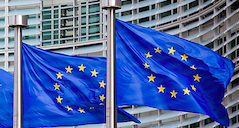The European Commission on Friday approved a €5.4 billion hydrogen project jointly funded by 15 EU countries and 35 companies including Alstom and Daimler Truck.
The Commission said the hydrogen project is of “common European interest” as it seeks to diversify its energy sources amid fears of supply pressures and possible fuel rationing this winter.
“The project, called ‘IPCEI Hy2Tech’ was jointly prepared and notified by fifteen Member States: Austria, Belgium, Czechia, Denmark, Estonia, Finland, France, Germany, Greece, Italy, Netherlands, Poland, Portugal, Slovakia and Spain.”
The Commission said the member states will provide up to €5.4 billion in public funding, which is expected to unlock additional €8.8 billion in private investments.
As part of this IPCEI, 35 companies with activities in one or more member states, including small and medium-sized enterprises (SMEs) and start-ups, will participate in 41 projects.
Commissioner for the internal market, Thierry Breton, said: “Promoting hydrogen development and deployment will boost jobs and growth throughout Europe while contributing to our green and resilience agenda.
“It enables the clean transition of energy-intensive industries and increases our independence from fossil fuels. With this IPCEI, we see EU hydrogen production moving ‘from lab to fab’; and our industry turning technological mastery into commercial leadership.
“And of course, we are not only supporting hydrogen through funding. We have also made decisive progress on building partnerships through the Clean Hydrogen Alliance and are developing EU-wide rules for enabling the hydrogen market and creating dedicated infrastructure.
“Because we know what is at stake: Europe’s position as a leading region for the hydrogen industrial transformation.”
